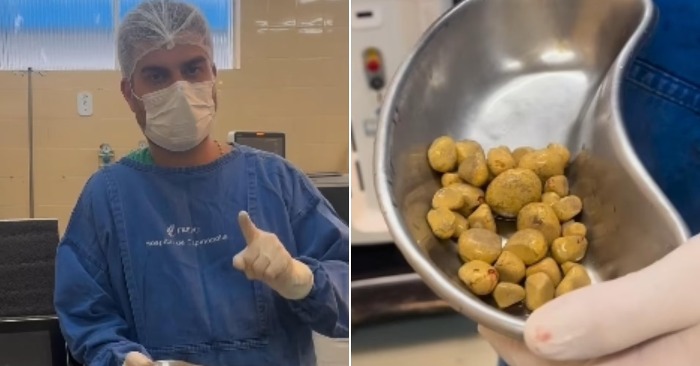A Brazilian urologist has gone viral after revealing a shocking case that highlights the dangers of drinking too many sugary soft drinks — especially Coca-Cola.
Dr. Thales Andrade posted a video on Instagram showing the aftermath of a surgery where he removed a staggering 35 stones from a man’s bladder. The patient, according to Andrade, had been consuming around three liters of Coca-Cola every single day. The video quickly gained attention and has now been viewed over 8.5 million times.
In the clip, Dr. Andrade walks viewers through the procedure and explains how excessive consumption of sodas packed with sugar and phosphoric acid can lead to kidney stones — hard, crystal-like formations made from calcium and other minerals that build up in the urinary system. He even displayed several large, yellow stones that had to be surgically extracted.
What Causes Kidney Stones?
Kidney stones form when waste materials in the blood crystalize and accumulate over time. Dr. Andrade pointed out two major reasons soda can speed up this process:
Sugar overload: High sugar levels raise calcium in the urine, encouraging stone formation.
Phosphoric acid: Found in most soft drinks, this acid alters the kidney’s environment, making it easier for stones to develop.

The Hidden Dangers of Ignoring the Problem
If left untreated, these stones can travel through the urinary tract, creating serious health risks. Symptoms often include:
Severe pain in the lower back
Nausea and vomiting
Blood or discomfort during urination
In some extreme cases, complications can lead to kidney damage or even life-threatening infections like sepsis.
Too Much Soda? Here’s What Doctors Want You to Know
Dr. Andrade used the viral moment to send a clear message: watch what you drink. “Maintaining healthy kidneys starts with daily choices,” he emphasized. Staying hydrated with water and avoiding excessive soft drinks can significantly lower the risk of stone formation.

Who’s Most at Risk?
According to data from the National Kidney Foundation:
1 in 10 people will develop kidney stones at some point, typically between ages 30 and 60.
Smaller stones can sometimes pass naturally through the urine.
Larger stones, like the ones in this case, often require surgery if they cause pain or block the urinary system.
This case serves as a serious reminder: your drinking habits can have a major impact on your health. So the next time you reach for a soda, think twice — your kidneys might thank you.
Have you ever experienced kidney stones or know someone who has? Share your story in the comments — we’d love to hear from you.







